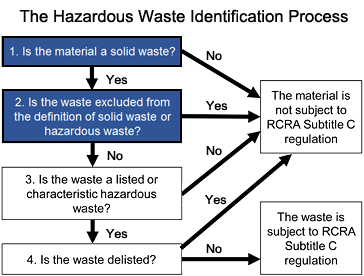More About Reclaim Waste
Table of Contents7 Simple Techniques For Reclaim WasteReclaim Waste Can Be Fun For EveryoneNot known Facts About Reclaim WasteRumored Buzz on Reclaim WasteNot known Details About Reclaim Waste
Via appropriate fluid waste administration, firms can minimize energy-intensive treatment procedures and disposal prices. They also obtain to preserve resources and designate them in various other appropriate procedures. There are various policies that secure public health and the atmosphere. By adhering to a system for managing liquid waste, firms can stay clear of pricey penalties and penalties and prevent adverse attention.(https://reclaimwaste1.carrd.co/)Gather depictive samples from various factors within the waste stream to ensure accuracy. Conduct regular screening to track any type of changes in the structure. Keep detailed records of characterization for future reference and conformity functions. Liquid waste, specifically hazardous ones, positions substantial threats during this action. Correct procedures minimize spills, leaks, and various other crashes that could hurt the employees and the public.

Sanitation (e.g., chlorination, ultraviolet light, ozonation) and nutrient removal (e.g., denitrification and phosphorus elimination) are advised under stringent policies. Various companies broke several fluid waste disposal regulations in current years.
The Ultimate Guide To Reclaim Waste

Shallow containers contain fluid waste that is allowed to vaporize via natural procedures. This type of disposal is subject to rigorous ecological regulations due to potentially unsafe exhausts.
The findings must be recorded, analyzed, and kept not just for submission to governing authorities but additionally for making renovations in the future. Use dependable equipment, approaches, and software services to make certain exact and regular data collection. Keep updated on appropriate environmental policies and market criteria. Share information with pertinent stakeholders (e.g., workers, governing federal government agencies, and nearby neighborhoods) to preserve openness and responsibility.
Comprehending these can assist them effectively handle their operations and reduce their environmental impact. Firms that can not invest in facilities ought to think about collaborating with the public sector for far better services.
What Does Reclaim Waste Mean?
By applying detailed monitoring systems that include therapy and recycling strategies, routine surveillance, danger analyses, and adherence to regional and government policies, commercial facilities can contribute to the defense of groundwater materials, ensuring their schedule for future generations (liquid waste disposal). Let's dig right into the significance of reliable fluid waste management in the industrial field, focusing on its implications for securing groundwater sources
The pollution of groundwater sources as a result of incorrect liquid waste monitoring in the commercial sector has significant consequences for human health, agriculture, and the atmosphere in its entirety. A few of the possible influences triggered by such contamination consist of: Polluted Alcohol consumption Water Products: As groundwater provides a substantial section of our drinking water, contamination from commercial tasks can lead to damaging chemicals and bacteria entering our water supply, posing wellness risks for people.
Minimized Agricultural Efficiency: Agriculture depends heavily on groundwater for watering; consequently, contaminated water can prevent plant returns, infect agricultural items, and influence food safety and security. Provided the relevance of preserving groundwater sources, it is crucial for organizations to take an aggressive position in managing their liquid waste sensibly and preventing air pollution.
4 Simple Techniques For Reclaim Waste
Liquid waste can contaminate land and contaminate waters. Under the Protection of the Environment Procedures Act 1997, organizations that create fluid waste are needed to handle it in such a way that shields the setting and the area. Info regarding managing and keeping fluid waste, reacting to spills and minimizing fluid waste is readily available in the complying with reality sheets and guidance:.
The duty of waste administration experts in securing this precious resource can not be overstated. Contaminated water and polluted effluent administration: Guaranteeing that unsafe fluids are securely gotten rid of and dealt with before they can hurt our water resources.
Hence, incorporating sustainable liquid waste monitoring into economic planning boosts economic security and protects the atmosphere, showing the worth of this method. In conclusion, embracing expert fluid waste administration techniques is critical for making certain a sustainable future, shielding our environment and securing the wellness of future generations.
When it concerns throwing away waste, adhering to proper procedures is critical for a wide range of factors. Proper garbage disposal is not practically tidiness; it's regarding ensuring the wellness of our environment, health and wellness, and the reliable usage of resources. Comprehending the significance of effective waste monitoring can aid all of us add to a healthier, cleaner world.
The Main Principles Of Reclaim Waste
Efficient waste Home Page monitoring aids preserve tidy streets and public spaces, decreasing the visual influence of clutter and ensuring that waste does not hurt wildlife. When waste is not dealt with appropriately, it can cause contamination, where unsafe materials can seep right into the soil, water systems, and the air, producing long-lasting environmental problems.